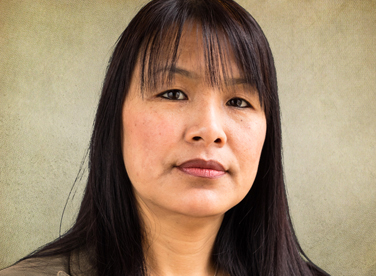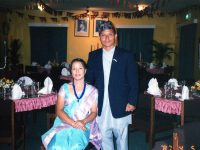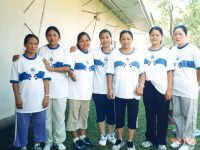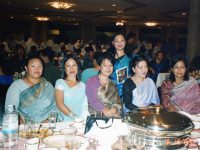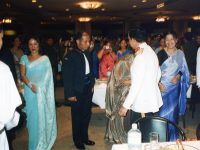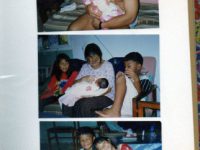Rup Maya Pun
Rup Maya Pun, Gurkha wife
(Portrait © Gurkha Voices Oral History Project)
Once a Gurkha soldier had served in the army for three years he was given his ‘Nepali leave’ of six months to return home for the first time since he joined up. It was his chance to show his village and family what he’d achieved. During this time, a soldier usually chose his wife through an arranged marriage. If they were lucky they could return together to his army base in Brunei, Hong Kong etc, but usually his wife would stay in Nepal for the next three years until he returned again. After his second Nepali leave a Gurkha usually had permission to return with his wife and live in the married quarters on base. This is the context for how the veterans for Gurkha Stories chose their wives between 1953 to 1986.
During our recording sessions with the veterans it was very clear how a Gurkha’s wife is the strong backbone to their family and home life. She is relied upon to run the home, the children’s lives for years and years separated from her husband. In fact, it wasn’t unusual to only live together for 3-5 years out of your husband’s 15 year career in the army. So we wanted to include some of the wives’ stories and their amazing perspectives of being a Gurkha’s wife.
-
Rup Maya and Umesh
-
Netball team, Hong Kong
-
Officers' formal dinner
-
Family holiday, 1994
-
Meeting Sultan of Brunei
-
Rup Maya's husband, Umesh, and family
Rup Maya Pun married Umesh Pun at aged 17 in Nepal and they moved permanently to Colchester in 2006, making it their base for when Umesh retired from the army in 2010. She has lived in many countries supporting her husband in his army roles. Now that they have settled permanently in Colchester, Rup works full time as a ward host at Colchester General Hospital and supports the family business (Gurkha restaurant and pub). She is an active member of the Colchester Nepalese community, assisting with charitable and cultural events.
(More of Rupa’s stories are in our book, published later this year. Keep posted via our blog: www.gurkhastories.wordpress.com)
Interview Extract (based on interpreter's translation):
My name is Rup Maya Pun. My father’s name is Namu Pun, he’s an ex Gurkha, and my mother’s name is Binda Mutay Pun. I was born in the village called Kafaldada, west part of Nepal, in 1969.
My father was in the Gurkha Army and once he retired he worked for the Sultan of Brunei with the Gurkha Reserve Unit, based in Brunei. My mother, my two sisters and I, we all lived in our village back in Nepal. During that period, unfortunately my mother passed away.
Once my mother passed away, we three siblings were separated for three years [and sent to different relatives to live]. And after about three years my father returned home on Nepal leave from the GRU in Brunei and he decided to take us to Pokhara [Western Nepal]. So after three years we got together again, and then we moved to Pokhara. But the other relatives told my father he need to get another marriage.
Once we were in Pokhara, my older sister and myself joined the school. My father got married, to our stepmother, and after about a year he took us all to Brunei. I was around nine years.
After about two years in Brunei, then whole family went back to Nepal. My father decided staying with the stepmother is not a good idea because stepmother might give us a hard time. Stepmother is like stepmother! So he decided that, I should stay with my auntie, his sister. So where we stay, was not actually in the town Pokhara, it was a little bit away from Pokhara, it’s like the village, and a farm. There wasn’t electricity… and we have to collect water, firewood, grass.
Auntie had only sons, no daughters. Probably that is the reason we have to work as girls work in the house… I think that’s the way, our custom, it’s because as a daughter you are working in house, looking after the house, doing almost everything compared to son, because son is a little bit different, the way they are treated, but that’s the way of our culture. We feel we were treated differently, but we never explained what we going through to father because we thought he’s going to be worried.
After about a year, my father returned from Brunei. By that time, my stepmother, she already have two babies, so after a year, once father returned from Brunei, we all get together again in Pokhara as a family. Once we get together in Pokhara then we continue our education in girls’ high school, where only girls study. I was eleven years old.
Because of no job in Nepal, my father had to go abroad. So he went to Abu Dhabi and we stayed in Nepal. During that time my younger two sisters, which is from my stepmother, they went to the boarding school. We continued studying in the government school. And about four, five years later, my father returned from Abu Dhabi. When I was about 16 years old, my stepmother told me, “You can’t continue to study in the school because I have to send my own children to boarding school.” I heard the argument between my father and step mother but my father didn’t notice what we were hearing.
I realised that if I said to him, “Yes, I want to study.” my father definitely would keep me in school, but if that happened, obviously, my stepmother wouldn’t like that, so they will have a very unsettled time at home. That is the reason I decided to support my father if he asked me to get married rather than studying. I respected him because he did so much for us. So I didn’t refuse to get married when he asked me to take a husband.
During that time, [1986], it was very different compared to now, because at that time a lot of young girls, 16, 17, 18 years, their dream was to get married to a Gurkha. I still remember on that night… my grandmother came and explained, “You’ll have a good life. It’d be good for you because of the Gurkhas.” So without seeing even his face, I just–, you know, my husband just put the wedding ring in my finger.
Because of our arranged marriage, I didn’t know anything about my husband … but after about a month, the way we were talking [together], I start to realise that I made a good decision. Two months later we were living in Hong Kong and moved into the regiment married quarters called Beverly Gardens.
Once we were in Hong Kong, my husband had to do a course … and he used to go there from Monday to Friday, and then the weekend he back in home, every Friday. Few months later he went to courses in UK for about six, seven months while I stay in Hong Kong, and during that time we were already expecting our first baby together.
(More of Rup Maya’s stories are in our book, published later this year. Keep posted via our blog: www.gurkhastories.wordpress.com)
Oral histories: © Gurkha Voices Oral History Project

